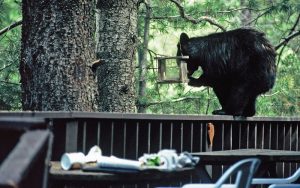- Slug: BC-CNS-Bears, 440 words.
- Photo and caption below.
- Video here.
By EMILY RICHARDSON and JENNIFER MAGANA
Cronkite News
PHOENIX – Hungry, thirsty black bears are making their way from the wilderness into the city, and it hasn’t gone well for the animals. In the past week, the Arizona Game & Fish Department has put down three bears that posed threats to public safety.
State wildlife officials are patrolling Show Low, Yarnell, Pinetop and towns along the southern Arizona-Mexico border for bears, which seek human environments for quick meals and accessible water.
Arizona’s longstanding drought is making it more difficult for bears to find natural sources of food and water, driving them to visit neighborhoods, Game & Fish officials said.
“It starts with a curious, hungry bear just looking for some food, and they find some easily accessible and highly rewarding food in the terms of calories content,” Game & Fish wildlife biologist April Howard said.
Once a bear realizes it can easily eat in urbanized areas, it begins to lose its fear of humans, which makes a public safety issue.
“These bears that come into neighborhoods get used to human food and don’t have a lot of negative responses from humans,” Howard said, “so they start to lose their fear of humans, they don’t see us as harmful, and so eventually that could lead to them approaching humans in search of food.”
Stan Cunningham, Arizona State University professor and wildlife biologist, said bears like the two put down really aren’t wild anymore.
“That bear has associated humans with food and will eventually take food away from humans or decide that humans are food,” Cunningham said.
What most commonly lures bears into urban locations is garbage left outside. If fact, homeowners are 70 percent more likely to encounter a bear if they leave garbage outside, according to a study conducted by Pinetop-Lakeside in the 1990s.
If you see a bear in your neighborhood, Arizona Game & Fish officials recommend keeping pets inside and calling 911. Don’t approach it and don’t do anything that would encourage the bear to stick around. To keep bears from sniffing around your property, keep all trash inside a secure area, take bird feeders down at night and keep all food inside.
“All too often,” said Shawn Wagner, Arizona Game & Fish wildlife manager, “well-intentioned homeowners think they’re helping wildlife” by leaving out food and water. What they don’t realize, he said, is that “such activities are not only detrimental to wildlife, but they put everyone’s safety at risk.”
This story is part of Elemental: Covering Sustainability, a new multimedia collaboration between Cronkite News, Arizona PBS, KJZZ, KPCC, Rocky Mountain PBS and PBS SoCal.
Connect with us on Facebook.
For more stories from Cronkite News, visit cronkitenews.azpbs.org.
^_=
